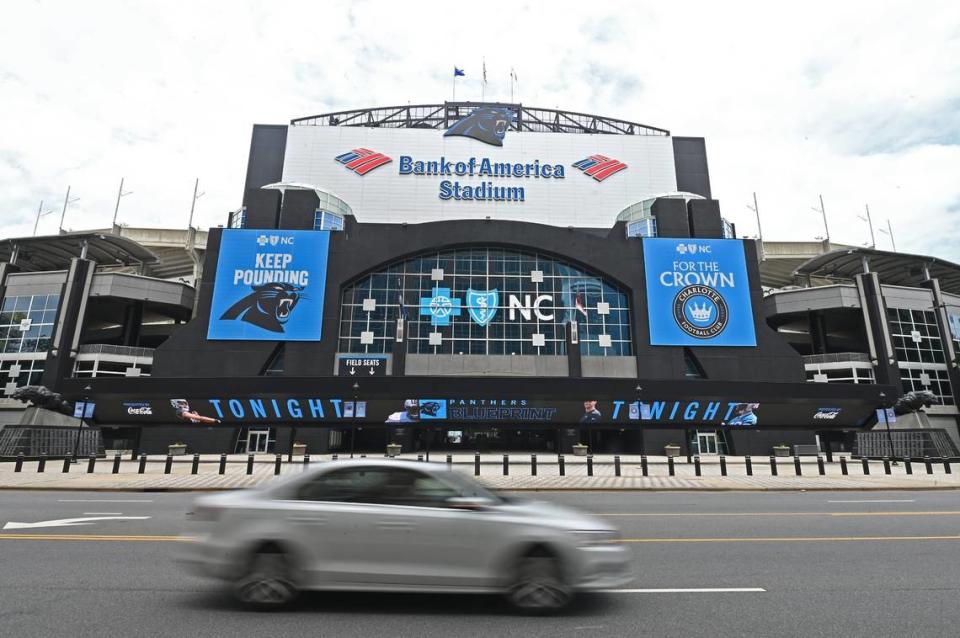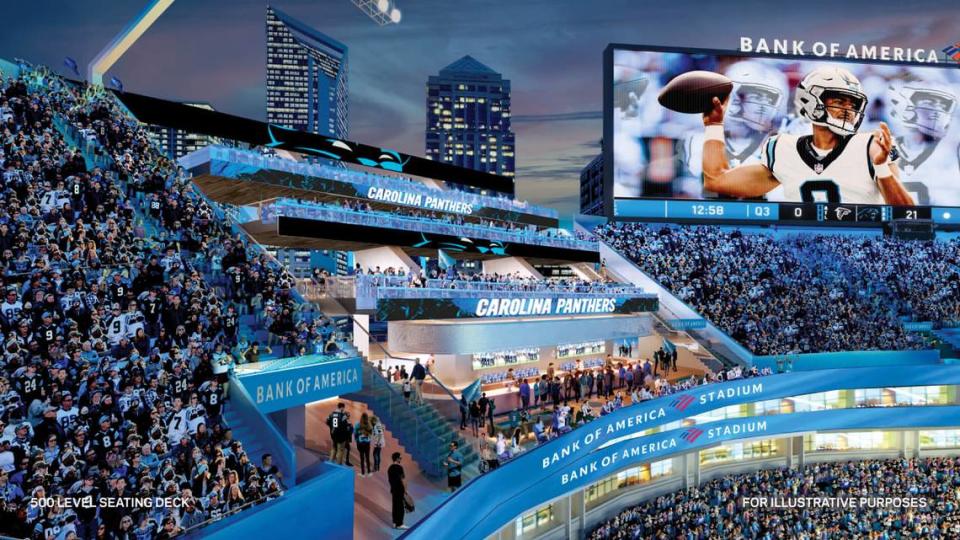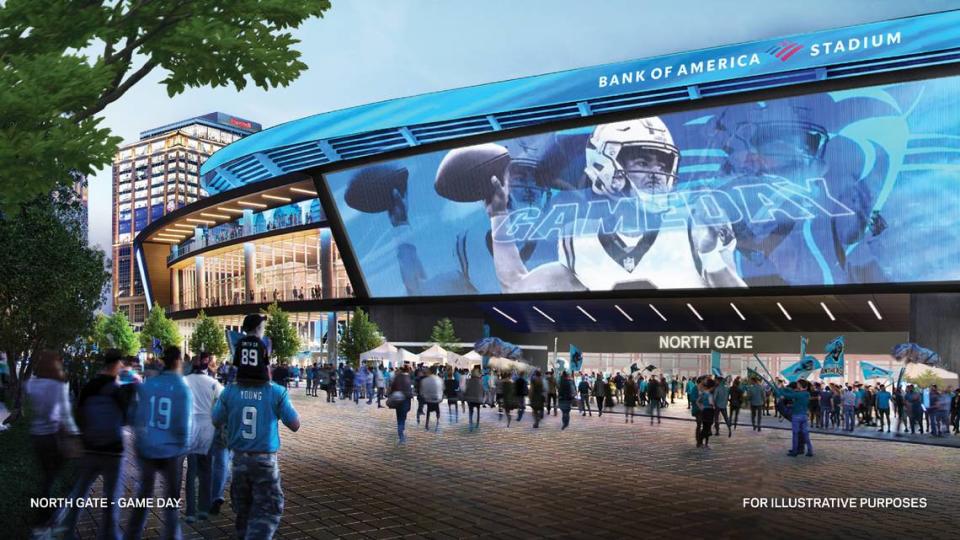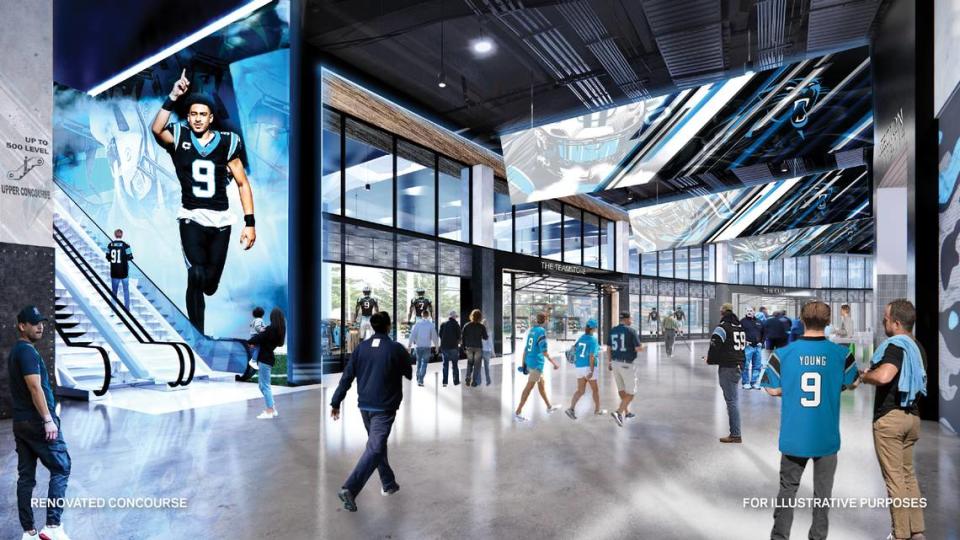Should Charlotte pay for renovations at Bank of America Stadium? ‘Tough’ call, says expert
While Charlotte leaders weigh plans to help renovate Bank of America Stadium, published research and experts question the value of spending hundreds of millions of dollars on the project.
Tepper Sports & Entertainment — the ownership group of the Carolina Panthers and Charlotte FC led by David Tepper — unveiled its plan Monday for the largest and most expensive renovation yet to the nearly 30-year-old facility.
It calls for $650 million from the city of Charlotte — money from a pot of tax revenue that must be spent on tourism-related projects. Tourism officials already scolded Charlotte once this year for talking about using tourism money for other projects.
The Charlotte City Council could vote on the project as soon as June 24. The deal would include a 20-year non-relocation agreement for both the Panthers and Charlotte FC.
Here's our latest accountability reporting
Reality Check reflects the Charlotte Observer’s commitment to holding those in power accountable. Here are three of our stories from this week:
→ Fate of damaged Charlotte house where shootout killed four officers remains murky
→ CMS wants rules if NC private schools get new voucher money
→ Huntersville wants people to pay by the hour if records requests take too long. Is it legal?
At Monday’s council meeting, city staff said the stadium had a $1.1 billion economic impact on the Charlotte metro area in 2023 and renovations would help keep that going and create jobs.
“It’s really investing into a community asset,” assistant city manager Tracy Dodson said.
But decades of research show economic impacts of stadium renovations and professional sports often are inflated as requests come before municipalities. Taxpayers, meanwhile, have pumped tens of billions into projects around the country.
Davidson College economics professor Fred Smith said city leaders face a “really tough” decision when weighing the benefits and costs.
“My biggest concern is that these are often sold as being engines of economic growth that are going to generate a lot of jobs and generate a lot of new spending in the metropolitan area, and the empirical evidence for that is incredibly limited,” he said.
How much money does Bank of America Stadium generate?
Monday’s presentation to the City Council said the Panthers in 2023 generated $706.4 million in economic impact in the Charlotte metro area, plus an additional $234.2 million from Charlotte FC and $169.5 million from concerts and other events at the stadium. The presentation didn’t elaborate on how those numbers were calculated.
The stadium also helps generate tax revenue across the metro area — an estimated $54.3 million — and supports 9,111 jobs, the presentation said.
But Smith, who teaches sports economics and studies the athletics’ financial impact, said the figure presented “sounds like it’s far too large.”
“That is not uncommon when these sorts of things are being discussed,” he said.
“The problem with these studies,” Smith said, “is that they fail to account” for the fact that people would typically spend the disposable income they put towards going to a game or concert into something else in the community, such as going to a restaurant.
“(Economic impact studies) typically are going to overstate the true net impact of the stadium because they don’t typically do a particularly good job of taking into account those substitutions,” he said.
Do stadiums benefit local economies?
It’s paradoxical that local governments still “subsidize sports facilities despite overwhelming evidence of their economic impotence,” declared a 2022 paper in the Journal of Economic Surveys that looked at more than 130 studies across 30 years.
“Though findings have become more nuanced, recent analyses continue to confirm the decades-old consensus of very limited economic impacts of professional sports teams and stadiums,” the paper said.
That argument against public investments in stadiums is decades old, too.
The rationales that stadiums create jobs, generate spending and tourism and attract business “contain bad economic reasoning that leads to overstatement of the benefits of stadiums,” the Brookings Institution said in 1997. A 2001 paper published in the Federal Reserve’s “Regional Economist” said cities that heavily invested in stadiums and arenas “experienced slower income growth than those that have not” on average.
On the question of creating jobs, Smith said local construction crews would have other projects if not working on a stadium.
Still, he added, there are “intangible benefits” to having and keeping professional sports in a city, including the team’s fans building a community and avoiding “the psychological cost” to a city of losing a team.
“This is really about how we want to spend public dollars, knowing that a lot of the benefits are intangible and the benefits of attending games is something that’s going to be enjoyed by a relatively small portion of the population,” he said of the decision facing Charlotte.
The Charlotte Regional Business Alliance called the stadium “a vital ingredient in any economic development formula, and one of the most important assets in the Charlotte Region.”
“From sporting events to concerts, the stadium raises the bar on our quality of life and gives Charlotte the ultimate competitive advantage for businesses and talent. In order to remain competitive, we must play to win. An upgraded stadium allows this region to do that,” the group said in a statement in support of the renovation plan.
Could tax dollars be spent on other needs?
Another issue Charlotte faces: the limited scope of how the city can spend money requested for the stadium.
The city’s investment would come from hospitality tax revenue — the city’s Convention Center Fund. Those dollars come from a 1% sales tax on prepared food and beverages and a 3% hotel occupancy tax.
The General Assembly last year extended Mecklenburg County’s 1% meals tax until 2060. The extension was something Charlotte’s hospitality industry and local leaders began to advocate for more as reports of an impending ask from the Panthers surfaced.
The money couldn’t be used on issues such as affordable housing, homelessness or public safety, Council member Malcolm Graham said Monday.
Council member Renee Johnson proposed earlier this year trying to put hospitality money into transportation, but that idea drew swift condemnation from the tourism industry. The NC Restaurant & Lodging Association noted in a letter to city leaders at the time another North Carolina county was taken to court over its “misuse” of occupancy tax money it put towards public safety.
In our CLT Politics newsletter, we offer exclusive insight into Charlotte-region politics sent to your inbox on Thursdays. Subscribe for free. Story idea? mramsey@charlotteobserver.com.

 Yahoo Finance
Yahoo Finance 











